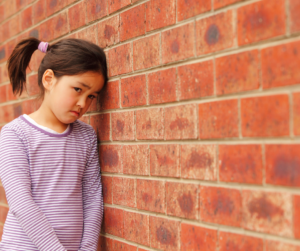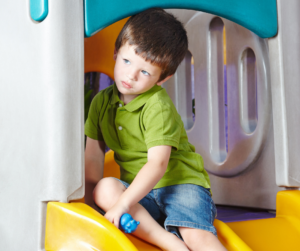Selective mutism is when an adult or child doesn’t speak in certain social situations. However, selective isn’t really the right word for it. The person who isn’t speaking isn’t selecting not to speak. They are in a situation where they do not feel safe talking and their resulting anxiety is stopping them. Selective mutism occurs because of anxiety. Anxiety is often present for those with autism, ADHD, and other challenges. This can make it challenging to understand if a child isn’t speaking because of selective mutism or because of another communication issue.
I’m going to share a personal story today about my family’s experience with selective mutism. Our experience is only one experience, but I hope that for at least a few of you out there, this story is helpful.
Preschool
 My oldest child, Rae, started preschool at age 4. Prior to that, she was a precocious child who talked a lot. She was also super sensitive and more aware of other people and their feelings than most kids. Rae had had babysitters, so this wasn’t her first time away from a parent. I selected a “Mother’s Day Out” program instead of a professional preschool for a few reasons. The biggest reason was that a friend was willing to take Rae to and from the program while I was at work two days a week. I only worked those two days, and the friend provided child care before and after preschool.
My oldest child, Rae, started preschool at age 4. Prior to that, she was a precocious child who talked a lot. She was also super sensitive and more aware of other people and their feelings than most kids. Rae had had babysitters, so this wasn’t her first time away from a parent. I selected a “Mother’s Day Out” program instead of a professional preschool for a few reasons. The biggest reason was that a friend was willing to take Rae to and from the program while I was at work two days a week. I only worked those two days, and the friend provided child care before and after preschool.
As far as I understand it, Rae wasn’t mute on her first day of preschool. She participated just fine. However, after a few days of school, she started having issues. My neurodiverse (not yet diagnosed) child was not fitting into the program. She saw other children get in trouble for talking and made a choice to never get in trouble by talking. She later told me that the teachers had told the children not to interrupt them, and then chatted together all day. This made my child feel like they didn’t have time to listen to her. There was no safe time to speak, as far as her little brain could tell.
Mutism Causes Problems
 Not speaking in preschool meant that my child was not able to ask to go the bathroom and had accidents instead. She was given another child’s nap mat and couldn’t argue that wasn’t hers. She developed a rash because she is allergic to laundry soaps that are not “free and clear” which this other child’s mother had used. She gave up and shut down and didn’t learn much there.
Not speaking in preschool meant that my child was not able to ask to go the bathroom and had accidents instead. She was given another child’s nap mat and couldn’t argue that wasn’t hers. She developed a rash because she is allergic to laundry soaps that are not “free and clear” which this other child’s mother had used. She gave up and shut down and didn’t learn much there.
In contrast, at home the other 5 days of the week, she talked about everything. Though she didn’t discuss school much. She used large words. She cooperated. She was fully potty trained at home. Everyone told me to give her a chance to adjust to preschool, but it wasn’t working. The school was also not working with me about Rae’s fine motor delays, which was very frustrating to this OT.
So We Quit
 After about three months of the preschool situation getting worse and worse, I pulled her out and Rae was homeschooled ever after. Now here is where the story gets interesting. Rae did not need therapy of any kind to get over her selective mutism. She just needed to get away from the place that was causing her so much anxiety. Partially because preschool had gone so badly, I decided to homeschool Rae. Over the years, Rae took classes of all different kinds. She participated in scouting. She talked to teachers and scout leaders and gave presentations in front of her co-op classes. She is now in college and participates in speaking in her college classes.
After about three months of the preschool situation getting worse and worse, I pulled her out and Rae was homeschooled ever after. Now here is where the story gets interesting. Rae did not need therapy of any kind to get over her selective mutism. She just needed to get away from the place that was causing her so much anxiety. Partially because preschool had gone so badly, I decided to homeschool Rae. Over the years, Rae took classes of all different kinds. She participated in scouting. She talked to teachers and scout leaders and gave presentations in front of her co-op classes. She is now in college and participates in speaking in her college classes.
Rae was diagnosed with an anxiety disorder and a communication disorder. In her teenage years, we have addressed these things in a variety of ways. She says she still has the urge to be silent in large groups or when lots of people are talking. However, it isn’t the debilitating problem she had as a preschooler.
As a result of Rae’s experiences, I have some recommendations for those working with children with selective mutism, which is really situational mutism.
Help for Others
First, observe the situation where your child becomes mute. Look for what is triggering your child’s anxiety. Is it a fear of punishment, like Rae had at school? It is a fear of strangers? Have they been teased or picked on in this situation before? If your child can’t talk about it at the time, make time to discuss why they don’t feel okay talking in that situation later, when they feel safe. Let them know that it is okay to express whatever was making them anxious.
Next, you need to address their anxiety and what is causing it. Really dig in with your child about what they fear. Do they fear rejection? Being asked something they don’t know the answer to? Do they fear punishment or teasing? Depending on the situation, these fears may be justified. Try to talk through those fears, so that you can relieve them or address them. If your child has legitimate fears of punishment, as Rae did, you need to consider your options. You need to realize that the person working with your child has lost their trust and may never be able to regain it.
You and I both know that not all adults are safe adults to speak to. There are dangerous people out there. This means that explaining to kids when it is and isn’t safe to talk to people can be difficult. It is very important to be patient. Address all issues you are able to address. Create situations where your child can speak to people where they feel safe. The more your child uses their voice, the more comfortable with it they will become.


 Laura Sowdon, OTR/L is an occupational therapist, writer, speaker, educator, and creator of the Five Senses Literature Lessons homeschool curriculum. She has worked as an occupational therapist with children in public and private schools, as well as private practice. Laura has taught and managed homeschool co-ops as well as homeschooling her own three children. Laura is dedicated to the idea of educating children at a pace that aligns with brain and physical development milestones and respects neurodiversity in all its forms.
Laura Sowdon, OTR/L is an occupational therapist, writer, speaker, educator, and creator of the Five Senses Literature Lessons homeschool curriculum. She has worked as an occupational therapist with children in public and private schools, as well as private practice. Laura has taught and managed homeschool co-ops as well as homeschooling her own three children. Laura is dedicated to the idea of educating children at a pace that aligns with brain and physical development milestones and respects neurodiversity in all its forms.


